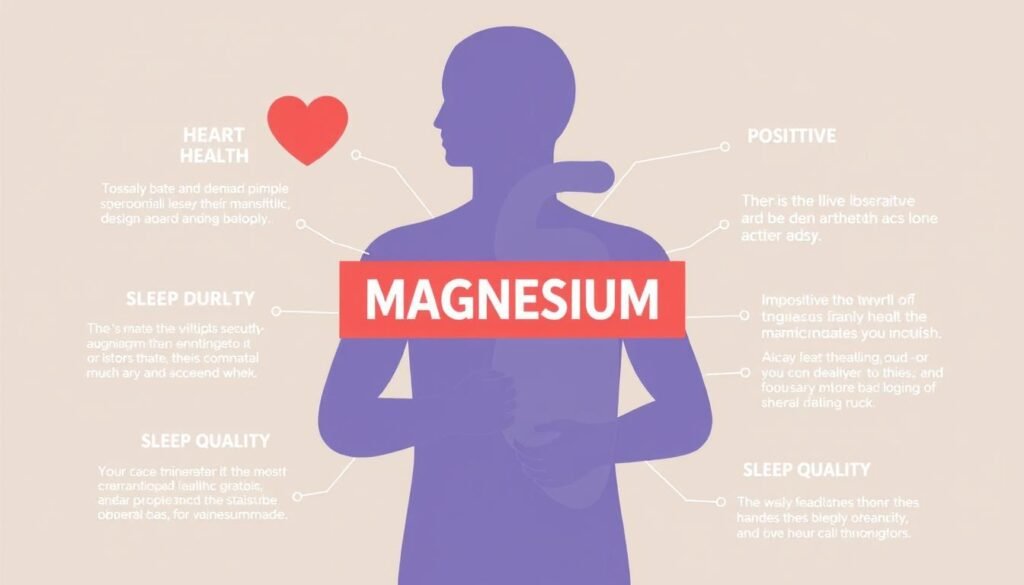
Magnesium is a crucial mineral for the body’s functions, playing a significant role in maintaining normal blood pressure, strong bones, and a steady heart rhythm.
It is involved in over 300 biochemical reactions, making it essential for overall health and wellbeing. Despite its importance, many Americans don’t get enough magnesium in their diets, leading to various health issues, including poor sleep quality and heart problems.
This comprehensive guide will explore how magnesium supports vital bodily functions and why proper levels are necessary for optimal health. You’ll discover practical ways to incorporate this powerful mineral into your daily routine for maximum benefits.
Key Takeaways
- Magnesium is essential for over 300 biochemical reactions in the body.
- Many Americans lack sufficient magnesium in their diets.
- Magnesium supports better sleep and heart health.
- Practical “magnesium hacks” can be incorporated into daily routines.
- Proper magnesium levels are crucial for overall health.
The Essential Role of Magnesium in Your Body
Maintaining adequate magnesium levels is critical for overall well-being. Magnesium is a vital mineral that supports numerous bodily functions, from energy production to nerve function.

What Magnesium Does for Your Health
Magnesium is essential for energy production, nerve function, and muscle relaxation. It helps regulate heartbeat, supports bone health, and aids in the regulation of blood sugar levels. As emphasized by health experts, “Magnesium is a critical component in the prevention and treatment of various diseases.”
Magnesium’s role in energy production is particularly significant, as it is involved in the synthesis of ATP (adenosine triphosphate), the molecule that provides energy to cells.
Signs of Magnesium Deficiency
Magnesium deficiency can manifest through various symptoms, often subtle and easily overlooked. Early signs include loss of appetite, nausea, vomiting, fatigue, and weakness. As the deficiency progresses, it can lead to more severe health issues such as numbness and tingling, muscle cramps, and abnormal heart rhythms.
- People with gastrointestinal disorders are at a higher risk of magnesium deficiency due to impaired absorption.
- Individuals with type 2 diabetes are also more susceptible to magnesium deficiency.
- Long-term alcohol misuse can lead to magnesium deficiency.
Understanding these warning signs is crucial for identifying potential magnesium deficiency before it leads to more serious health complications.
Magnesium Benefits: From Sleep to Heart Health
Magnesium is a multifaceted mineral that offers a wide range of health benefits, from improving sleep quality to supporting heart health. Its role in the body is complex and far-reaching, impacting various physiological processes.

How Magnesium Supports Heart Function
Magnesium plays a crucial role in maintaining heart health by supporting heart function and regulating blood pressure. It helps in the relaxation of blood vessels, improving blood flow and reducing the risk of heart disease. Adequate magnesium levels are associated with a lower risk of cardiovascular disease.
Magnesium for Anxiety and Stress Reduction
Magnesium has a calming effect on the nervous system, making it beneficial for reducing anxiety and stress. It acts on the hypothalamic-pituitary-adrenal (HPA) axis, regulating the body’s stress response. By maintaining optimal magnesium levels, individuals can better manage stress and anxiety.
Benefits for Muscle Function and Recovery
Magnesium is essential for muscle function, facilitating the contraction and relaxation processes. It is necessary for energy production within muscle cells, helping to convert glucose into ATP. Adequate magnesium levels can help prevent painful muscle cramps and support recovery after exercise by reducing inflammation and muscle soreness. Athletes often use magnesium supplements to support recovery and improve performance.
The benefits of magnesium for muscle health are multifaceted, including regulating neuromuscular transmission, supporting protein synthesis, and maintaining electrolyte balance during prolonged exercise.
Magnesium for Sleep: How It Works as a Natural Sleep Aid

Magnesium has emerged as a potential natural sleep aid, backed by research and user testimonials. As a mineral essential for numerous bodily functions, magnesium plays a crucial role in regulating sleep patterns.
Research indicates that magnesium supplementation can improve sleep quality and duration by influencing various physiological processes.
The Science Behind Magnesium and Sleep
Magnesium’s role in sleep regulation is supported by its effects on the body’s internal clock and sleep-wake cycle. Taking magnesium regularly may help increase deep sleep time, the most restorative phase of sleep crucial for memory consolidation and physical recovery.
How Magnesium Regulates Melatonin and GABA
Magnesium influences the production of melatonin, a hormone critical for sleep regulation. Additionally, magnesium affects GABA (gamma-aminobutyric acid), a neurotransmitter that helps calm the brain and nervous system, promoting relaxation and reducing stress.
Improving Sleep Quality and Duration
Beyond simply helping you fall asleep, magnesium for sleep may significantly improve overall sleep quality and duration through multiple mechanisms. Studies indicate that magnesium supplementation may reduce nighttime awakenings, helping maintain continuous sleep throughout the night.
- Research suggests that taking magnesium regularly may help increase deep sleep time.
- Magnesium’s anxiety-reducing effects may help quiet racing thoughts that often interfere with falling and staying asleep.
- Taking magnesium before bed may help address sleep issues related to restless leg syndrome.
- Some research indicates that magnesium may help normalize sleep patterns in individuals with irregular sleep schedules.
- Clinical studies have found that combining magnesium with other sleep-supporting nutrients may provide enhanced benefits for sleep quality.
Types of Magnesium Supplements: Which One Is Right for You?
Magnesium supplements come in various forms, each with distinct benefits. Understanding these differences is crucial for selecting the most appropriate supplement for your specific health needs.
Magnesium Glycinate: The Sleep-Friendly Option
Magnesium glycinate is highly regarded for its ability to promote relaxation and improve sleep quality. It is gentle on the stomach and has a calming effect on the nervous system, making it an ideal choice for those who struggle with falling asleep or staying asleep throughout the night.
Magnesium Citrate: For Digestion and Absorption
Magnesium citrate is well-known for its high bioavailability and gentle laxative properties, making it an excellent option for those with digestive issues. It can help regulate bowel movements and alleviate symptoms of constipation.
Magnesium L-Threonate: For Brain Health
Magnesium L-threonate is a form of magnesium that has been shown to improve cognitive function and has potential benefits for memory and learning. It is capable of crossing the blood-brain barrier, making it particularly effective for neurological health.
Magnesium Oxide: For Deficiency and Heartburn
Magnesium oxide contains a high percentage of elemental magnesium, making it effective for addressing magnesium deficiency. It is also commonly used to relieve heartburn and indigestion due to its antacid properties. However, its bioavailability is relatively low, which may require higher doses and could potentially lead to digestive side effects.
In conclusion, the choice of magnesium supplement depends on individual health needs and goals. Whether you’re seeking to improve sleep, support heart health, or address a deficiency, there’s a form of magnesium that’s right for you.
Magnesium Dosage: How Much Do You Need?

Recommended Daily Allowances by Age and Gender
The recommended daily intake of magnesium varies by age and gender. For adults, the general recommendation is around 400-420 mg per day for men and 310-320 mg per day for women. Pregnant women may require slightly higher doses. It’s essential to consult with a healthcare provider to determine the most appropriate dosage for your specific needs.
Optimal Dosage for Sleep Improvement
For sleep benefits, the optimal magnesium dosage can range from 200 to 400 mg taken before bedtime. Taking magnesium approximately 1-2 hours before bed allows sufficient time for absorption and activation of sleep-promoting pathways. Some individuals may notice improvements in sleep quality within a week, while others, especially those with a severe deficiency, may take longer to experience benefits.
When to Take Magnesium for Best Results
The timing of magnesium intake can significantly impact its effectiveness. For general supplementation not targeting sleep, consistent daily intake is more important than the specific timing. However, taking magnesium with food can improve absorption and reduce the risk of digestive side effects like diarrhea. If you’re taking larger doses, consider splitting your intake between evening and morning doses to minimize side effects.
Natural Food Sources of Magnesium
Magnesium is a crucial mineral that can be adequately obtained through a well-planned diet rich in whole foods. Eating whole foods is always the best approach because magnesium can be lost during refinement and processing. By focusing on magnesium-rich foods, you can maintain optimal magnesium levels in your body.

Top Magnesium-Rich Foods to Add to Your Diet
Incorporating magnesium-rich foods into your diet can be both delicious and easy. Start with breakfast by having oatmeal topped with nuts and fruits like bananas. For lunch, consider leafy green salads with pumpkin seeds, almonds, and avocado. These foods are not only rich in magnesium but also provide other essential nutrients.
Some of the top magnesium-rich foods include:
- Nuts and seeds like almonds, cashews, and pumpkin seeds
- Leafy greens such as spinach and kale
- Legumes, including black beans and chickpeas
- Whole grains like brown rice and quinoa
- Fish like mackerel and salmon
- Dark chocolate
Creating a Magnesium-Boosting Meal Plan
Designing a meal plan that focuses on magnesium-rich foods can help ensure a consistent intake of this essential mineral. Begin by planning your meals around whole grains, vegetables, and magnesium-rich protein sources. For instance, you can have grilled salmon with quinoa and steamed broccoli for dinner. Snacking on nuts, seeds, and dark chocolate between meals can also help boost your magnesium levels.
To maximize magnesium intake, it’s also important to minimize processed foods and adopt cooking methods that preserve magnesium, such as steaming instead of boiling. Additionally, maintaining adequate hydration supports the proper utilization of magnesium in the body.
Conclusion: Incorporating Magnesium for Better Health
As we explored the various benefits and types of magnesium supplements, it’s clear that incorporating magnesium into your daily routine can have a significant impact on overall health. Magnesium supplements offer a practical solution for many people struggling with sleep issues, heart health concerns, and stress management.
When incorporating magnesium into your wellness routine, it’s essential to consider individual health needs, existing conditions, and potential interactions with medications. People with certain health conditions, such as kidney disease, heart disease, and diabetes, should consult healthcare providers before starting magnesium supplementation to minimize the risk of adverse effects.
The risk of serious side effects from magnesium is low when taken at recommended doses, but exceeding the upper limit can cause digestive disturbances and, in extreme cases, more serious health complications. A combined approach of dietary sources and targeted supplementation provides the most balanced way to optimize magnesium levels, ultimately supporting overall well-being and reducing the risk associated with magnesium deficiency.




